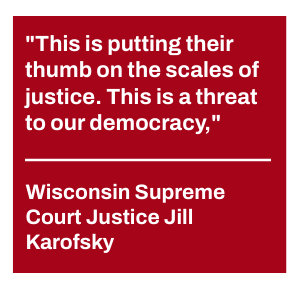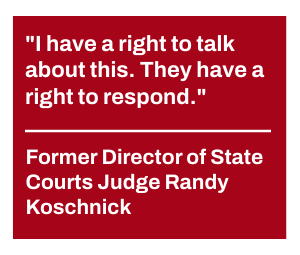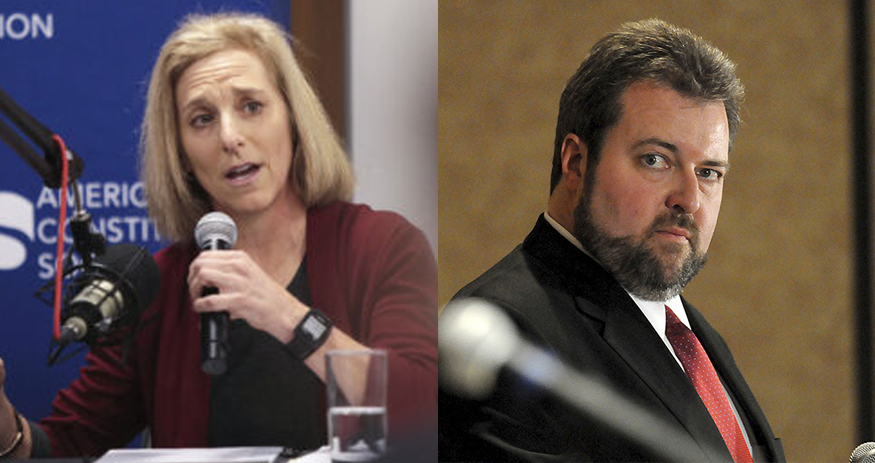Wisconsin Supreme Court justice issues dire warning, judge warns Democrats stifling First Amendment
By: Steve Schuster, [email protected]//March 14, 2024//
Wisconsin Supreme Court justice issues dire warning, judge warns Democrats stifling First Amendment
By: Steve Schuster, [email protected]//March 14, 2024//
A Wisconsin Supreme Court justice has issued a warning — democracy is under attack in the Badger State.
“They (Right-wing extremists) are trying to weaponize the judiciary through threats, and trying to intimidate us on how to decide a case,” said Wisconsin Supreme Court Justice Jill Karofsky during an exclusive interview with the Wisconsin Law Journal on Monday.
Karofsky is referring to a complaint filed by former Courts Director, Judge Randy Koschnick.
Koschnick’s complaint was filed with the Wisconsin Elections Commission over the selection of Milwaukee County Circuit Court Judge Audrey Skwierawski to serve as interim Director of State Courts while Skwierawski was a sitting judge.
Ironically, the liberal majority Wisconsin Supreme Court tapped the former Scott Walker appointee for the role.
Liberals are saying Koschnick’s actions of speaking to the press is a threat to democracy as it violated their own privacy in what was intended to be a sealed complaint.

“This is putting their thumb on the scales of justice. This is a threat to our democracy,” Karofsky told the Wisconsin Law Journal.
Democrats claim pursuant to Wisconsin statutes complaints are secret to protect the privacy of both parties, however, Koschnick spoke to the news media about the complaint, in what Koschnick said is within his First Amendment rights.
Koschnick contends that the secrecy only applies to proceedings and not the complaints.
Koshnick pointed out confidentiality of proceedings, as required by Wisconsin statutes, is very different than discussing a complaint that he wrote himself on his home computer.
“My complaint is not a proceeding, as discussed in the Wisconsin statute. I never discussed any proceedings with the media. I only released to the media what I had written on my own computer,” Koschnick said.
Sec. 757.93(1)(a) provides that “proceedings” of the judicial commission are confidential.
“My complaints were not ‘proceedings’ of the commission. By contrast, ‘proceedings’ of the commission would include, for example, the proceedings which are actually listed in secs. 757.85 – 757.89, such as investigations, issuing of subpoenas, issuing orders for medical examinations (all under sec. 757.85), jury panel proceedings (under 757.87), conducting hearings (under 757.89), etc.,” Koschnick said.
“The filing of a complaint by a whistleblower, such as myself, is not included in this statutory listing of proceedings. Further, publicizing such a complaint about illegal, corrupt behavior by a public official, such as a Supreme Court justice, is certainly protected by the First Amendment. I did nothing wrong. I did not violate any rule or statute. I never disclosed any information to anyone about any such proceedings,” Koschnick added.
According to the actual pertinent text of sec. 757.93(1)(a), “All proceedings under ss. 757.81 to 757.99 relating to misconduct or permanent disability prior to the filing of a petition or formal complaint by the commission are confidential unless a judge or circuit or supplemental court commissioner waives the right to confidentiality in writing to the commission. Any such waiver does not affect the confidentiality of the identity of a person providing information under par. (b).”
On Tuesday, the Republican-controlled Wisconsin Senate removed four members of the Judicial Commission, as well as a number of other liberal gubernatorial appointments. As previously reported, Gov. Tony Evers slammed the removals.
The removals come months after a liberal majority took over the Wisconsin Supreme Court, in what other media reports referred to as a rush “to exert its newfound influence.”
The emails reveal previously unknown details of how the liberal majority rushed to exert its newfound influence and the conservatives, no longer in the majority for the first time since 2008, tried to slow things down.
Meanwhile, back on the Supreme Court, according to the liberal justices, in August of 2023, “Judge Randy Koschnick engaged in a publicity stunt by immediately announcing to the media that he filed complaints with the Commission regarding the selection of Milwaukee County Circuit Court Judge Audrey Skwierawski to serve as interim Director of State Courts. Judge Koschnick’s antics were nothing more than a partisan attempt to undermine the court’s authority to hire his successor,” the liberal justices said in August of 2023.
During an exclusive interview with the Wisconsin Law Journal on March 12, Koschnick said, “I am a whistleblower, simply alerting the public that four justices have violated the state constitution. They allege I violated the statutes (by talking to the media). They are wrong about that.”
As far as the allegations of being a threat to democracy, attempting to intimidate the Court, Koschnick disagreed, and said it’s quite the opposite, as he is defending democracy by exposing the corrupt behavior of the liberal Supreme Court.
“That doesn’t make any sense. How would I intimate them (the liberal Supreme Court justices) to decide a case differently,? ” Koschnick asked, noting, “I didn’t even have a case before the Court.”
“It’s nonsensical. What would I have intimated them about?” Koschnick added.
As for Koschnick’s First Amendment claim, Karofsky said that doesn’t make sense.
“Everyone knows the First Amendment doesn’t mean you can just say anything to anyone at anytime,” Karofsky said, noting that what Koschnick did not only violate her own personal privacy, but was likely also in direct violation of Wisconsin statutes and the Administrative code.”
Koschnick previously served as a Jefferson County Circuit Court judge prior to his appointment as courts director in 2017.
Koschnick said there was no formal conference or meeting of the justices, but yet he was removed him from the job before conclusion of his six-year term and without a formal meeting, calling the move “unprecedented.”
Koschnick was given an award by the State Bar of Wisconsin for his work in 2020 to keep state courts running during the pandemic through the use of technology. He also was instrumental in resolving the court reporter shortage in Wisconsin and, as previously reported, had a passion for keeping Wisconsinites safe by proposing sweeping cyber security initiatives protecting courts and hospitals. Koschnick spoke of hospital cyber security threats well before the recent attacks.
Justices demand action
Three Wisconsin Supreme Court Justices — Rebecca Dallet, Jill Karofsky and Janet Protasiewicz — demanded the Wisconsin Judicial Commission take action against Koschnick.
In a copy of a letter obtained by the Wisconsin Law Journal, the justices are calling for protection for judicial independence.
“We respectfully request … the Commission take further action in order to protect judicial independence in the State of Wisconsin,” the justices wrote.
“We urge the Commission to rectify this oversight and now clearly signal both to Judge Koschnick and any others tempted to flout the confidentiality laws, that such violations will bring swift and sure public admonition and discipline,” the Justices wrote.
“We implore the Commission to take all steps necessary to ensure that it does not continue to be used as a weapon against judicial independence. Frivolous complaints must be dismissed with expediency and those who violate the rules and statutes governing the Commission must be held to account. The people of Wisconsin, the judiciary, and our democracy demand nothing less,” the justices added.
Hijack the judicial disciplinary system
As previously reported by the Wisconsin Law Journal, judicial complaints are confidential under Wisconsin law, but Karofsky herself released documents to The Associated Press just last month on Feb. 11. The released documents show a retired Maryland attorney filed a complaint against Karofsky in 2021 with the Wisconsin Judicial Commission. The commission decided in November 2022 not to discipline her, but warned her to remain neutral and avoid making sarcastic remarks from the bench.
Karofsky’s attorney, Stacie Rosenzweig, admonished the Judicial Commission in her Feb. 7 letter for letting partisan actors “hijack the (judicial) disciplinary system, in an attempt to silence a justice who rightfully tried to stop frivolous and dangerous arguments that undermined our democracy.”
Skwierawski’s response
In August of 2023, Skwierawski issued a statement affirming her commitment to deliver justice for Wisconsinites.
“For the past 30 years, I have worked hard every day to deliver justice for the people of Wisconsin, as a local prosecutor, as an assistant attorney general, and as a judge,” Skwierawski wrote in a statement obtained by the Wisconsin Law Journal.
“When I was asked to continue that mission as interim Director of State Courts, I carefully read the relevant statutes, ethics opinions, and cases to ensure I met the qualifications. I consulted numerous colleagues, attorneys, judges, about the challenges of our system — so that I bring more than my own experience,” Skwierawski continued.
“And I consulted legal experts to ensure that as a judge, I could serve in this position. Based on all those conversations, and in large part on the ethics opinion by my former boss, Attorney General J.B. Van Hollen, I believe that serving as interim director is legally, ethically, and constitutionally sound.”
“More than that, it is my honor and privilege to answer this call to serve the Supreme Court, the Court of Appeals, and our Circuit Courts, and to work alongside the hundreds of judges, commissioners, court reporters and staff members who strive each day to make real the promises of our justice system for the people of Wisconsin,” Skwierawski added.
However, both conservative members of the Supreme Court and the Wisconsin Legislature disagreed and said it is illegal under Wisconsin law for Skwierawski to hold that position under Article VII, Section 10 of the Wisconsin Constitution and Wis. Stat. § 757.02(2).
Wisconsin Supreme Court Justice Rebecca Bradley was critical of Koschnick’s termination, calling it an “abuse of power” that is “unprecedented and illegitimate.”
“Political purges of court employees are beyond the pale. Four or five justices secretly voting on court matters without the court actually meeting breaches universal judicial norms. This abuse of power is unprecedented and illegitimate. It should be condemned by all judges,” Bradley wrote.
Legal community reaction
Fond du Lac County District Attorney Eric Toney, who serves as president of the Wisconsin District Attorney’s Association, also spoke out against the termination on social media, calling it “sad but unsurprising considering the newest Justice campaigned on her political values. If this firing happens it could be the first step in a left-wing politicization of the court. This should concern all Wisconsinites and it makes the 2025 Supreme Court race crucial.”

In an Aug. 3, 2023 letter obtained by the Wisconsin Law Journal, Speaker Robin Vos and Senate Majority Leader Devin LeMahieu said, “Judge Skwierawski cannot serve as the Director of State Courts until the expiration of her term in the Milwaukee County Circuit Court. Her appointment, effective August 3, 2023, was unlawful and should be rescinded. The constitution demands no less.”
According to the letter, the Wisconsin Constitution art. VII, §10(1) stipulates, “No … judge of any court of record shall hold any other office of public trust, except a judicial office, during the term for which elected.”
Pursuant to Wis. Stat. § 757.02(2), the same prohibition states: “The judge of any court of record in this state shall be ineligible to hold any office of public trust, except a judicial office, during the term for which he or she was elected or appointed.”
In other words, a judge or justice in Wisconsin is prohibited from holding another office of public trust unless it is a judicial office during their term. Skwierawski went from her role as a judge to holding the office of director of state courts.
Additionally, Wisconsin Supreme Court Rule (SCR) 70.01 (1) stipulates, “the director of state courts shall be the chief nonjudicial officer of the court system in the state.
Skwierawski retained counsel Matthew O’Neill.
In December of 2023, O’Neill issued a public statement condemning Koschnick’s alleged violation of Wisconsin law.
“Judge Randy Koschnick violated Wisconsin law by publicly disclosing that he filed a complaint against Audrey Skwierawski with the Wisconsin Judicial Commission. Such complaints are strictly confidential, specifically to protect judges from baseless allegations of misconduct and to prevent the Judicial Commission’s complaint procedure from being used for political purposes. That is precisely what Judge Koschnick did when he first publicized his complaint in August, and again when he publicly commented on the matter today,” O’Neill wrote in a statement obtained by the Wisconsin Law Journal.
During Tuesday’s interview with the Wisconsin Law Journal, Koschnick disagreed.

“I have a right to talk about this. They have a right to respond. The First Amendment is designed in part, to keep government officials accountable,” Koschnick said, noting, “I have not violated any statute or administrative code.”
In January of 2024, the Judicial Commission considered a complaint alleging Supreme Court Justice Rebecca Dallet’s administrative appointment of former Judge Audrey Skwierawski as interim director of State Courts while on leave of her position as a Milwaukee County circuit court judge amounted to violations of the Code of Judicial Conduct, including SCRs 60.02, 60.03(1), 60.04(1)(b), 60.04(1)(hm), and 60.04(2).1
According to Jeremiah C. Van Hecke, executive director of the Wisconsin Judicial Commission, the position of director of State Courts does not appear to meet several of these criteria, which are all required for a position to be considered an office of public trust.
“The Commission’s examination of this matter has resulted in a determination that there is no evidence of misconduct within the jurisdiction of the Commission to warrant further action or consideration by the Commission,” Van Hecke wrote in a letter to Dallet in January of 2024.
In a separate January 2024 letter obtained by the Wisconsin Law Journal, Van Hecke wrote to O’Neill, “The Commission has dismissed the matter against your client, as she resigned her position as a circuit court judge, effective December 31, 2023, and is no longer a judge subject to the Commission’s jurisdiction.”
“The Commission also noted that it has not conducted any prior investigations of your client’s conduct or filed any public judicial disciplinary cases against her,” Van Hecke added.
In a response letter obtained by the Wisconsin Law Journal from O’Neill to Van Hecke in January, O’Neill noted, “Judge Skwierawski spent 29 years building a sterling reputation in the legal community for sound and ethical decision making. She is gratified and vindicated by the Commission’s confirmation that her decision to serve the people of Wisconsin as interim director of State Courts was legally, constitutionally and ethically sound. Now that this matter is concluded, my client has elected to waive the confidentiality of these proceedings so she can clear her name.”
In a copy of the letter addressed to Dallet, obtained by the Wisconsin Law Journal, Van Hecke said the Commission carefully considered the Preamble to the Code of Judicial Conduct, constitutional and statutory limitations and criteria outlined by the Supreme Court in Martin, in which the Court held a position of public employment a public office must be of a civil nature, it must be created by the Constitution or through legislative act.
According to Van Hecke, the position of director of State Courts was created by Supreme Court Rule, not by the Constitution or a legislative act.
Van Hecke also said, “The director of State Courts position is at will, indefinite and subject to the control of a superior power (the Supreme Court), not an independent position,” noting the position of director of State Courts is not entered upon by taking an oath or giving an official bond.
This story has been updated.
Legal News
- Wisconsin attorney loses law license, ordered to pay $16K fine
- Former Wisconsin police officer charged with 5 bestiality felony counts
- Judge reject’s Trump’s bid for a new trial in $83.3 million E. Jean Carroll defamation case
- Dozens of deaths reveal risks of injecting sedatives into people restrained by police
- The Latest: Supreme Court arguments conclude in Trump immunity case
- Net neutrality restored as FCC votes to regulate internet providers
- Wisconsin Attorney General asks Congress to expand reproductive health services
- Attorney General Kaul releases update at three-year anniversary of clergy and faith leader abuse initiative
- State Bar leaders remain deeply divided over special purpose trust
- Former Wisconsin college chancellor fired over porn career is fighting to keep his faculty post
- Pecker says he pledged to be Trump campaign’s ‘eyes and ears’ during 2016 race
- A conservative quest to limit diversity programs gains momentum in states
WLJ People
- Power 30 Personal Injury Attorneys – Russell Nicolet
- Power 30 Personal Injury Attorneys – Benjamin Nicolet
- Power 30 Personal Injury Attorneys – Dustin T. Woehl
- Power 30 Personal Injury Attorneys – Katherine Metzger
- Power 30 Personal Injury Attorneys – Joseph Ryan
- Power 30 Personal Injury Attorneys – James M. Ryan
- Power 30 Personal Injury Attorneys – Dana Wachs
- Power 30 Personal Injury Attorneys – Mark L. Thomsen
- Power 30 Personal Injury Attorneys – Matthew Lein
- Power 30 Personal Injury Attorneys – Jeffrey A. Pitman
- Power 30 Personal Injury Attorneys – William Pemberton
- Power 30 Personal Injury Attorneys – Howard S. Sicula












